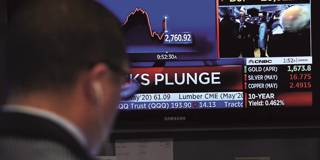Having witnessed the turmoil of the COVID-19 crisis, markets are focusing more than ever on the risks posed by climate change. In fact, it is now governments that are lagging behind in facilitating the financial industry's long-awaited shift toward more environmentally attuned standards and investment decisions.
LONDON – The COVID-19 pandemic is sharpening financial markets’ understanding of the need to address looming threats like climate change. This will likely be the year when investors and financiers decide to mainstream climate-transition analysis in their portfolios. Policymakers must recognize that markets are moving far faster than they are on this critical front.
This year, we have witnessed the biggest shock to the oil and gas market in 70 years. By the end of July, traditional oil and gas shares in the S&P 500 had fallen by 45%, Royal Dutch Shell had cut its dividend for the first time since World War II, and BP had written off $17.5 billion from the value of its assets. At the same time, clean-energy stocks had risen by just over 20%, roughly the same as the tech sector.
Disruption is a powerful incentive for investors and companies to reallocate capital. The sharp decline in energy prices has accelerated concerns about worthless “stranded assets” on companies’ books. A theoretical possibility has become a plausible scenario. Financiers are re-appraising their portfolios and weighing up the risks associated with a climate transition. So far, the key concern has been that green policies will work only if investors re-price the cost of capital for different firms.

LONDON – The COVID-19 pandemic is sharpening financial markets’ understanding of the need to address looming threats like climate change. This will likely be the year when investors and financiers decide to mainstream climate-transition analysis in their portfolios. Policymakers must recognize that markets are moving far faster than they are on this critical front.
This year, we have witnessed the biggest shock to the oil and gas market in 70 years. By the end of July, traditional oil and gas shares in the S&P 500 had fallen by 45%, Royal Dutch Shell had cut its dividend for the first time since World War II, and BP had written off $17.5 billion from the value of its assets. At the same time, clean-energy stocks had risen by just over 20%, roughly the same as the tech sector.
Disruption is a powerful incentive for investors and companies to reallocate capital. The sharp decline in energy prices has accelerated concerns about worthless “stranded assets” on companies’ books. A theoretical possibility has become a plausible scenario. Financiers are re-appraising their portfolios and weighing up the risks associated with a climate transition. So far, the key concern has been that green policies will work only if investors re-price the cost of capital for different firms.